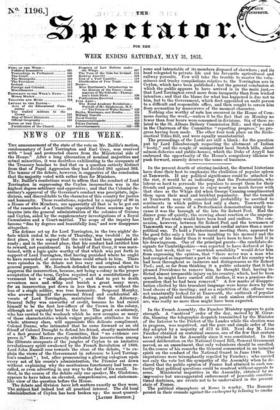NEWS OF THE WEEK.
THE announcement of the state of the vote on Mr. Baillie's motion, condemnatory of Lord Torrington and Earl Grey, was received With " loud and protracted cheers from the Ministerial side of the House." After a long alternation- of nominal majorities and actual minorities, it was doubtless exhilirating to the occupants of the Treasury benches to find that on a question entirely distinct from. that of Papal Aggression they had divided 282 against 202. The tenour of the debate, however, is suggestive of the conclusion that the majority voted with rather than for Ministers.
Mr. Baillie's resolutions went to affirm that the conduct of Lord Torrington in suppressing the Ceylon insurrection was in the highest degree arbitrary and oppressive; and that the Colonial Se- cretary's approval of the Governor's conduct was precipitate, inju- dicious, and discreditable to the character of this country for justice and humanity. These resolutions, rejected by a majority of 80 in a House of 484 Members, are apparently all that is to be got out of the researches of a Committee appointed three sessions ago to inquire into the general administration of the colonies of Guiana and Ceylon, aided by the supplementary investigations of a Royal Commission and a Court-martial. The scope of the inquiry has become "fine by degrees and beautifully less," and now disappears altogether.
The defence set up for Lord Torrington, in the two nights' de- bate which ended in the vote of Thursday, was twofold : in the first place, it was argued that the victim had been punished al- ready ; and in the second place, that his conduct had entitled him to reward, not punishment. In behalf of Earl Grey, it was main- tained, with a logic quite worthy of that which was put forth in support of Lord Torrington, that having pun+ sbid where he ought to have rewarded, of course no blame could attach to him. There were episodes in the debate not less racy and original than its general purport. Mr. Roebuck defended the measures adopted to suppress the insurrection, because, not being a colony in the proper acceptation of the term, Ceylon required not a constitutional go- vernment but a "mild despotism"; and that to put to death seventeen men and whip and banish a great many more, for an insurrection put down in less than a week without the loss of a single soldier, was true humanity. Sergeant Murphy, who avowed himself the personal friend and confidential dd- wade of Lord Torrington, maintained that the Attorney- General Selby was unworthy of credit, because he had raised himself to be the first law-officer of the Crown in the colony, although not regularly bred to the bar. The great ex-attorney, who has carried to the woolsack which he now occupies so many of those characteristics which vulgar prejudice attributes to the whole attorney class, will appreciate this delicate compliment. Colonel Dunne, who intimated that he came forward as an old friend of Colonel Drought to defend his friend, stoutly maintained of a fact proved before the Committee, that "no evidence can prove it." Mr. Hawes gravely attributed the insurrection among the illiterate occupants of the jungles of Ceylon to an imitative revolutionary spirit awakened by the French Revolution of 1848. Lord John Russell rose towards the close of the debate, " to ex- plain the views of the Government in reference to Lord Torring- ton's conduct " ; but, after pronouncing a glowing eulogium upon every act of his cousin's- administration, the Premier sat down without explaining why the meritorious functionary had been re- called, or even adverting in any way to the fact of his recall. In- deed, in the course of the debate only one speaker, Mr. Gladstone, appears to have taken an elevated, comprehensive, and statesman- like view of the question before the House. The debate and division have left matters exactly as they were. The subject had indeed lost all practical interest. The old local administration of Ceylon has been broken up ; the most quarrel- [Lunt EDITION.] some and intractable of its members disposed of elsewhere ; and its head relegated to private life and his favourite agricultural and railway pursuits. Few will take the trouble to master the volu- minous and trashy compilations relative to the Torrington tent in Ceylon, which have been published ; but the general conclusion at which the public appears to have arrived is in the main just,— that Lord Torrington erred more from incapacity than from wicked intention ; and that the blame for what has happened is due not to him, but to the Government, which first appointed an unfit person to a difficult and responsible office, and then sought to screen him from accusation by manoeuvres of the meanest character.
Nothing else worthy of note has occurred in the House of Com- mons during the week,—unless it be the fact that on Monday no fewer than four hours were consumed in divisions. Six of these re- lated to the St. Albans Bribery Commission Bill ; and they ended in the Chairman of the Committee " reporting progress," no pro- gress having been made. The other four took place on the Eccle- siastical Titles Bill, and were equally unsubstantial. The p sings of the Lords are still a blank : for the question put by Lord Fllenborough respecting the allotment of Indian " booty," and the couple of unimportant local Scotch bills, about salmon-fisheries and public-houses, which the Duke of Argyll has embraced the opportunity of the House's compulsory idleness to push forward, scarcely deserve the name of business.


























